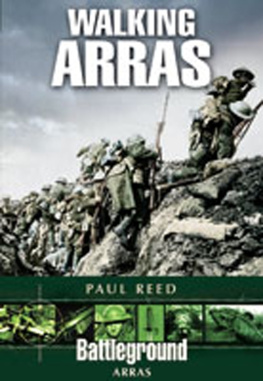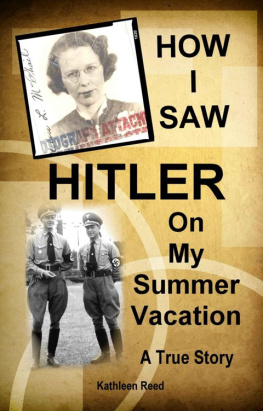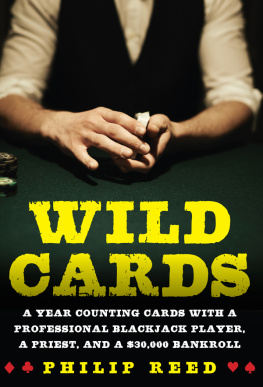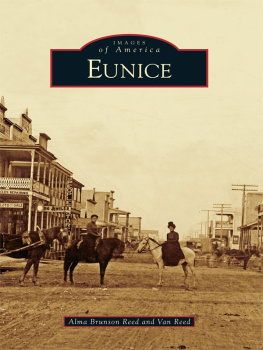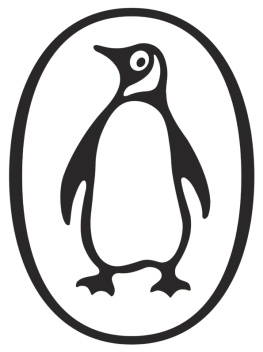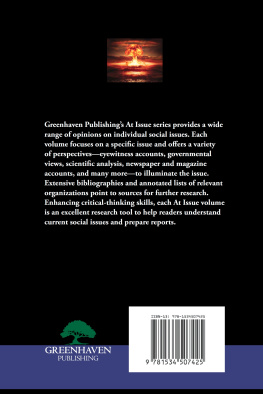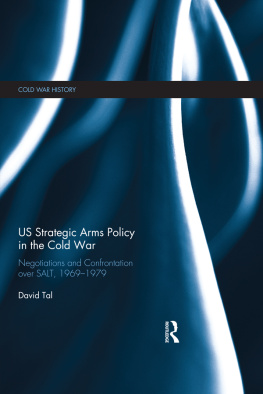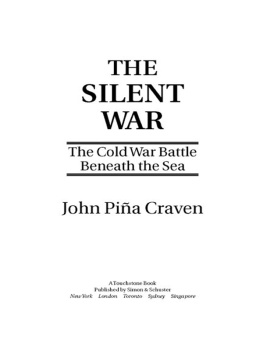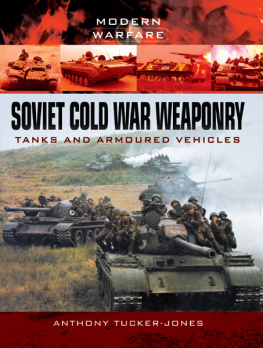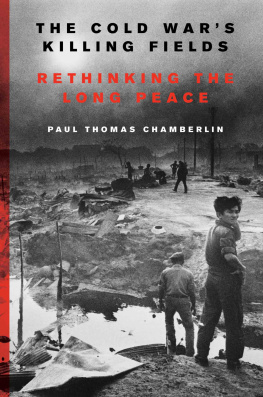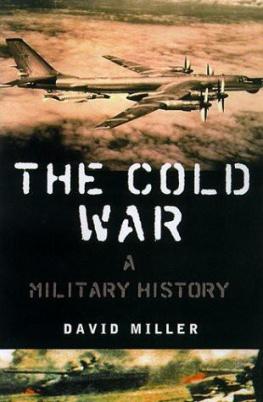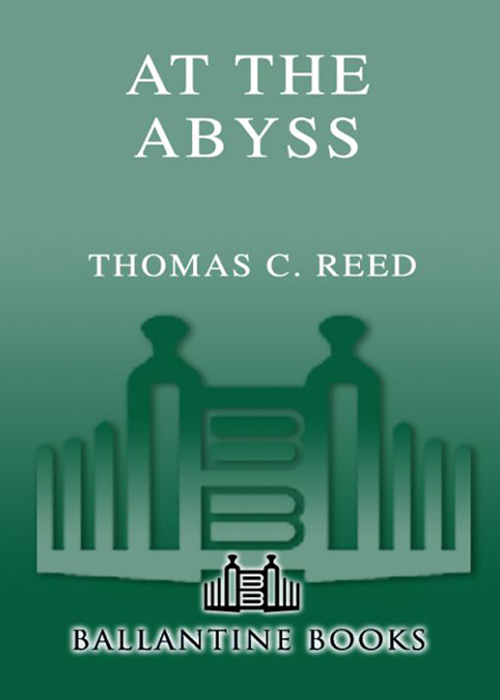
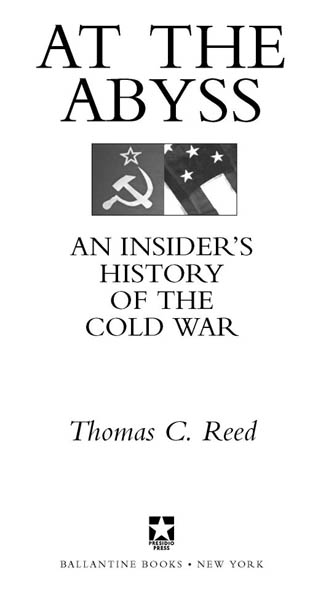
Table of Contents
To the Cold Warriors who did their duty, protected their honor, and defended
their countries. They did so with a vengeance, in the service of their own gods,
but they never lost their respect for the fires of hell that would surely follow
any careless act at the edge of the abyss.
[We are pushing] mankind toward the abyss of a world nuclear-missile war.
Soviet Chairman Nikita Khrushchev to U.S. President John Kennedy
OCTOBER 24, I962

ACKNOWLEDGMENTS
IN THE BEGINNING there was my mother and father, Naomi and Gordon Reed, who tried to instill the values of right and wrong that constitute the foundations of Western civilization. Their guidance channeled my life into an interesting career, supported (and at times opposed) by a host of scientists and soldiers, politicians and presidents. To every one I owe my greatest thanks, but to USAF Col. Jack Dodge, physicist Carl Haussmann, political pro Fred Hafner, and Deputy Defense Secretary Bill Clements I owe much more, for those gentlemen entrusted me with responsibilities that were beyond justification at the time of their granting. Then, in time, my deputies at the PentagonJohn Stenbit in Telecommunications and Jim Plummer in the Air Forcemade me look far better than I really was.
When the Cold War ended I was left with a drawer full of mental snapshots. Debbie and Charles Ball, Bill Clark, Harvey Sapolsky, Bob Setrakian, Kiron Skinner, and Mike Wheeler urged the reduction of those souvenirs to written form. At first the stories were inchoate, then they were given shelter by one of the most thoughtful agents ever to police up the literary back alleys of Manhattan. Phyllis Wender of Rosenstone-Wender brought focus, encouragement, and discipline to this wayward scribe; when done she placed the resulting work with Robert Kane, the editor of Presidio Press. That placement might not have happened without the encouragement of Paul Wilderson of the Naval Institute. Bob Kane and his associate, E. J. McCarthy, turned this authors notes into a tightly written story that I hope the reader will enjoy and remember.
In time the Presidio organization was acquired by Ballantine Books, a division of Random House. The talents of new editors, counselors, and publicistsZach Schisgal, Ron Doering, Laura Goldin, Brian McLendon, Heather Smith, and Colleen Lindsaywere brought to bear. Cover designer Carl Galian, assistant managing editor Crystal Velasquez, copyeditor Peter Weissmann, and their production associates delivered this work to the reader in tangible form.
The tales herein are but the extracts of a thousand lives. I am deeply indebted to all who let me into those lives for a brief moment, to share their triumphs and tragedies. Some were former presidents. George H. W. Bush, a friend of forty years, was kind enough to write the introduction to this book. That is altogether fitting, as he was the instrument of a safe windup to a most dangerous age. Gerald Ford tried, and at times succeeded, in entrusting me with awesome responsibilities; when it was over he took the time to talk about those days. I have known, or at least met, all the Cold War presidents, but those are the two I count as friends.
Others of my respondents were once officers and enlisted men in the mighty armies of the world, scientists in the weapons establishments on both sides, and intelligence operatives whose real names I still do not know. Many a Soviet, from Victor Adamskii to Sergei Zelentsov, risked censure by the shifting tides of an evolving Russia to share their memories. U.S. airmen C. R. Andregg, Ted Cochran, and Jim Stockdale, to whom the war was not cold at all, let me into their files and souls to better understand the terrible personal cost of that historic drama. National Security Advisor Bud McFarlane documented the importance of what seemed like mere days at the office to me. Reaganauts Clark, Herrington, Meese, and Nofziger added perspective to my wide-screen view of the fortieth president.
Many an old-timer opened windows into a dim and distant past: Efrem Petoukhov brought wartime Leningrad into grim focus. Andrew Goodpaster shared his perceptions of Eisenhowers thought processes. Arnold Kramish gave names to the opaque shadows only glimpsed in the Venona transcripts. Allan Puckett detailed the activities of his seminal Teapot Committee. Vitaly Adushkin showed me his snapshots of life at the Novaya Zemlya nuclear test site. Jack Real told of life as Howard Hughes last roommate in the drug-clouded resort hotels of Mexico.
Boris Altschuler, Dennis Bonney, Clifford Gaddy, Les Jardine, Tom Jordan, Andrew Marshall, and Harry Rowen all brought sharp scalpels to my postmortem of the Soviet economy.
Two academics had the bureaucratic stamina to pull back the veil of secrecy from hitherto unseen panoramas. Yuri Gaponov, of the Kurchatov Institute in Moscow, convinced MINATOM to hold a conference on the History of the Soviet Atomic Program in Dubna (north of Moscow) in the spring of 1996. Six years later Cargill Hall, of the U.S. National Reconnaissance Office, convinced the U.S. Intelligence Community to convene a seminar on the overflights of denied territories by U.S. aircraft during the 1950s. I was fortunate to be a key participant in both.
Research efforts for this book were organized and led by Susan Rice, Ken Alnwick, and P.J. Lenz. Their webs of virtual and real contacts brought substance to my impressions. Richard Childress, Gennady Gorelik, John MacLucas, Michael Warner, and Gus Weiss all granted access to their Cold War files, while Stu Spencer (who never took a note in his life) opened a treasure trove of insight into Ronald Reagans thoughts at key moments in history.
A variety of photographers (as noted) granted use of their works; Kate Kainu, Phil Schwartzberg, and Elena Ushakova helped with the graphics; Doctors David Anderson and Patrick Coleman kept me alive and able to withstand the rigors of travel to the ruins of the Soviet empire so that I might collect these tales.
Yet at the beginning and the end, it was my family who provided the inspiration and the rewards, for it was to preserve and protect their lives that the Cold War became my war. And when it was time to wind it all up, my dear wife, Kay, was the rock of support, the pillar of good judgment, the finder of Phyllis, and the dear friend who was indispensable to the whole endeavor.
Healdsburg, CA January 2004.
At the Abyss... is an astonishing and immensely valuable work that deserves to be studied by anybody who believes he knows his nations recent history.
Los Angeles Times
At the Abyss... not only provides a thorough history and analysis of the [cold] war, but takes a jarring lessons-learned portrait of the successes and failures in military policy and strategy that prolonged and placated perhaps the most enduring international conflict of this generation.
Sea Power
What Mr. Reed does eloquently is to show what the Cold War meant in real, everyday terms.
The Washington Times
At the Abyss is a pleasure to read. Solid, substantive, told in clear and simple prose, and generous in giving credit wherever its due... This is one of those books that will be listed in the bibliography of every competent book on the Cold War period published from now on.
Next page

